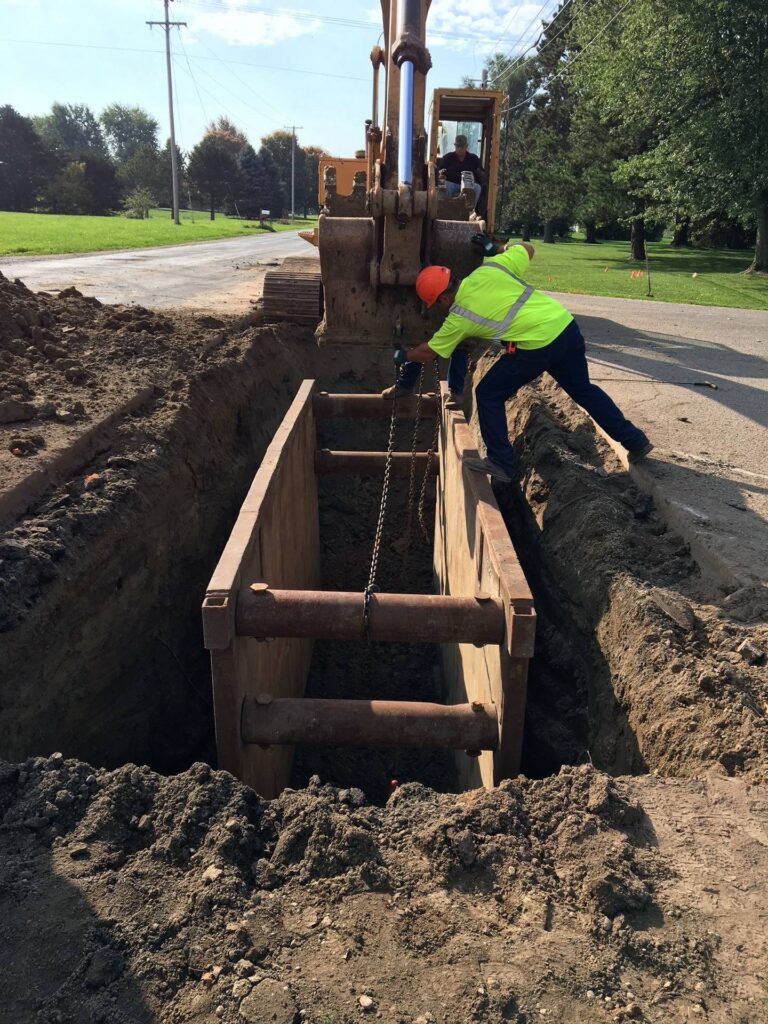
The Shiawassee County Road Commission (SCRC) is responsible for road and bridge construction on public roads located outside city and village limits.
Road construction projects are selected based on criteria including: pavement condition, traffic counts, available funding, and road classification (primary or local).
Due to limited road funding, SCRC must balance repair types with our available budget and make the right investment at the right time to preserve the overall road network. To learn more about road funding, visit our FAQ page for more information. (Insert Link to our FAQ on Road Funding).
The cost of road repairs depends on a number of variables, including the location, type of construction, the number of lanes, lane width, and the condition of the road. Road work typically cost more in urban areas than rural areas. Keeping a road in “good” condition is less expensive than rebuilding a deteriorated road.
Below are some common types of road construction projects. The costs mentioned in the descriptions below are estimates per lane mile. Please note that projects can cost more or less depending on the cost of materials, schedule, traffic volumes, environmental impacts, and other factors.
When a road is in “poor” condition, it may be rebuilt through a process of pulverization and resurfacing. SCRC uses a machine called a pulverizer which is capable of breaking up 6-10 inches of existing asphalt pavement. SCRC then recycles and compacts the pulverized asphalt to create a new road base. After establishing the new road base, crews apply two layers of new asphalt to create a smooth, long-lasting road surface. A pulverized and resurfaced road will last 10-15+ years and costs approximately $170,000 per mile.
Roads that are in “fair” condition are good candidates for a mill and resurfacing project. During a typical mill and resurfacing project, one layer (1.5–2 inches) of existing asphalt is removed (milled) and the road is resurfaced with a new layer of asphalt. A milled and resurfaced road will last around 5 – 7+ years. If the road has deteriorated into “poor” condition, milling one layer of the roadway is usually not enough to improve the ride condition and prevent future deterioration and potholes. Currently, the SCRC has no mill & resurface projects.
SCRC has utilized a road treatment on roadways that are considered “fair” and above condition, known as scratch course/chip/fog seal system. This treatment has been utilized by the SCRC for many years. It typically adds five (5) to seven (7) years to the lifespan of the roadway and has proven to be a great application for our roads. The scratch course is a 1-to-1.25-inch layer of hot mix asphalt (HMA). Approximately 1 to 3 months later, a chip seal is placed on top of that HMA along with a fog seal. The estimated cost for this treatment is $75,000.00 per mile.
Chip sealing is a relatively low-cost surface treatment that seals and prevents water from seeping into the roadway. Chip sealing helps prevent potholes and protects the road surface from the damaging effects of weather, sun, and traffic. A chip seal can help extend the life of a road by 3 – 5 years and costs approximately $30,000 per mile.
SCRC also fog seals roads after they have been chip sealed. A fog seal is another thin layer of liquid asphalt that is applied once the excess chips have been swept up. This additional treatment helps to seal in the stones and extend the life of a chip seal. Crews will return to fog seal within a couple of weeks after a road has been chip sealed, depending on the weather. Once the fog seal has been applied the road will be temporarily closed, vehicles will be prohibited from driving on it for a couple of hours as it cures.
Shiawassee County is home to 105 bridges, many of which were built in the early 1900s. Each year SCRC performs preventative maintenance on bridges with available resources. However, a bridge must be completely replaced if it is deemed structurally unsound during SCRC’s routine inspections.
Bridge replacement projects differ in scope depending on the type, size, traffic volume, and environmental surroundings. A bridge replacement will typically take 3-6 months to construct and can cost anywhere from $500,000 to $3 million depending on the size of the project.
SCRC is also responsible for the maintenance of several hundred culverts throughout our county. We are in the process of inventorying all of culverts throughout the county in 2021. Culverts allow water to easily flow underneath a road. They prefabricated and can be round, oval or box shaped. They can span between 1 and up to 20 feet.
Due to limited road funding, SCRC is focused on making the right investment at the right time (asset management) to save taxpayer dollars and extend the service life of our roads.
Asset management is similar to vehicle maintenance. You can wait until the engine fails before you take your car in for repairs, or you can take your car in for routine oil changes. Routine maintenance will make your car run smoother and avoid costly engine repairs. Road work is similar. SCRC performs preventative maintenance on roads that are already in “good” condition to extend the road’s lifespan and avoid costly reconstruction projects when a road falls into “poor” condition.
The tar and gravel you see on a road is called a chip seal or seal coat. During a chip seal project, a dump truck full of slag stone locks on to a chip spreader that is pulled backward. A thin layer of liquid asphalt is sprayed down in front of the chip spreader.
During the chip seal process- from the time the gravel is placed on the road to when the excess is swept away- the speed limit is 35 mph. At 35 mph, vehicles should not be damaged by loose stones.
Chip sealing is a relatively low-cost surface treatment that prevents water from seeping into the roadways, which helps prevent potholes and protects the road surface from the damaging effects of weather, sun, and traffic. A chip seal can help extend the life of a road by 3-5 years.
SCRC fog seals the roads after they have been chip sealed. A fog seal is another thin layer of liquid asphalt that is applied once the excess chips have been swept up. This additional treatment helps to seal in the stones and extend the life of a chip seal. This application is added within a couple of weeks after a road has been chip sealed, depending on the weather. Once the fog seal has been applied the road will be temporarily closed, vehicles will be prohibited from driving on it for a couple of hours as it cures.
Yes, with one exception – when crews are paving directly in front of a driveway, which typically takes 30-60 minutes. During paving operations, traffic must be restricted due to the extremely hot temperature of the asphalt and to minimize damage to the new road surface.
Paving is a moving operation and weather dependent. There is no exact schedule of when crews will be paving in front of a driveway. If you see crews nearing your residence, let them know your needs and they will assist you in entering or exiting your driveway safely.
If your vehicle sustained damage while driving through a construction zone on a road under the jurisdiction of SCRC, you may be eligible to file a claim. Please visit our (Link to our Damage Claim page) for more information. SCRC’s jurisdiction includes public roads located outside of city and village limits.
During the construction season, SCRC will post our projects on the website. Any road closures will be posted on our website including posted detours.
Trees are an important part of our roadways, but they can cause safety and damage concerns when located too close to the road. There are times where SCRC will remove healthy trees from the public road right-of-way before the start of road construction to make room for the work. Trees may also be removed during a roadside safety improvement project.
